When I entered graduate school, I knew one thing: I would never become a clinical psychologist. I had no idea what I wanted to do with my life, but I knew psychology wasn’t it, and I figured that spending a few years in a doctoral program was a good way to pass the time while my interests worked themselves out. (Side note: It isn’t. There are much easier ways to spend six years.)
Now I am the one thing I thought I would never be: a clinical psychologist. How in the world did that happen?
The truth is that I began graduate school with a narrow sense of what it means to be a psychologist. Over the course of my training, I learned that there are many ways to match your interests, passions, and values to a career in behavioral health and many opportunities to fall in love with this work.
Whether you have well-defined professional goals or are utterly confused about the path ahead, here are a few questions to consider as you work toward developing your professional identity and choosing a meaningful career.
What do you actually care about?
Graduate school asks a lot of you, from attending classes to providing clinical services, conducting research, teaching, writing, and serving on committees. The good news is that these many (many!) responsibilities give you numerous opportunities to find aspects of behavioral health that you enjoy. Start with the basics — what do you actually care about? You could engage in a formal activity like a values card sort or jot down a list of your interests and values. What do you want your life to be about? Not only in regard to your career, but overall.
Next, take a look at your experiences. What have been the most enjoyable aspects of graduate training so far? Why? What responsibilities do you wish you could avoid? What are the activities you’re really anticipating in future months or years of training? Maybe you can’t wait to start collecting data for your dissertation, or perhaps you are looking forward to beginning a course on clinical supervision.
What is it about these activities that excites you? Examine the nuances of your likes and dislikes — perhaps you find administering neuropsychological assessments boring, but love writing the reports. Why? Are there research articles you are eager to read? Are there popular blogs you’ve bookmarked or behavioral health apps you often use?
Learning what you like and what you’d rather stay away from is the first step in moving toward a meaningful career. As a trainee or early career professional, you are still a generalist, which means you have many opportunities to participate in enjoyable and not-so-enjoyable activities each day. Use those experiences to gather data on yourself.
What are the options?
While in training, it can sometimes seem as if the only career options are the ones your mentors and supervisors have chosen. But limiting yourself solely to what is in front of you reduces your options considerably. Behavioral health encompasses an incredible diversity of opportunities. Whether you recently enrolled in graduate school or are days away from finishing your postdoc, begin collecting information on possible careers.
- Sign up for professional listservs or email lists. Even if you are early in training, you can receive regular emails on job postings and postdoctoral fellowships, allowing you to see what types of positions exist. Many professional organizations, such as the Association for Behavioral and Cognitive Therapies (ABCT) and American Psychological Association (APA) have listservs that include occasional job postings as well as information of general interest to the community. APPIC also has several helpful email lists, including one devoted to job openings.
- Browse career websites. General sites like Glassdoor and Indeed can give you a broad sense of what types of behavioral health jobs exist. Websites such as The Chronicle of Higher Education, Academic Jobs Wiki, Psychology Job Wiki, and HigherEdJobs can help you learn about academic positions, including those at university-affiliated hospitals and counseling centers. The US government jobs website allows you to access any federal position, including clinical and research openings at NIMH, VA, and other government bodies. Organizations like the Society for Research in Child Development (SRCD), National Register of Health Service Psychologists, American Association for Marriage and Family Therapy, and ABCT have job boards cataloguing open positions. Most US states also have websites for positions within the state government, which can include community mental health and correctional settings.
- Talk to your mentors. This can include academic advisers as well as mentors from other aspects of your training, such as clinical supervisors, instructors with whom you’ve interacted as a student or teaching assistant, training directors, and postdoctoral fellows in your department or at your clinical practicum. Ask about what they do, including the benefits and challenges of their position. Learn more about how they chose a career and how they got to where they are. These conversations can be invaluable in helping you sort through your interests, and most people are happy to talk about their career path. Sharing your career interests and questions with mentors also helps them to be on the lookout for opportunities, information, and contacts to pass along to you. Use these resources.
- Expand your thinking. Technology companies, consulting firms, and nonprofits are often looking for behavioral health specialists and tend to post available positions on general job websites rather than specialized forums. Maybe you could work behind the scenes at your favorite behavioral health app!
As you scroll through listserv emails or check out open positions, pay attention to what feels exciting. If you read a job announcement and wish you could start tomorrow, take note: this could be a good fit. If you find yourself dozing off as you skim through the posting, that’s also helpful information. Keep a document with all of the job announcements that have sparked your interest and update it whenever you read about one that excites you.
What are the details?
One thing that can be easy to overlook amid talk of professional passions are the day-to-day realities of various careers. As you’re considering your options, gather data on the following elements:
- Average salary. If you are interested in a position in state or federal government, including public universities and university-affiliated hospitals, salaries are publicly available. The Chronicle of Higher Education maintains a website that summarizes salary data from various academic institutions. For private organizations, Glassdoor often includes salary estimates with its job advertisements and has a section in which current employees can post their salary to increase transparency.
- Benefits, including vacation and sick leave, health insurance, retirement benefits, and parental leave. Again, public institutions often make this information available online, so looking up data for institutions you might be interested in working for can be illuminating. Be careful not to get caught up in the excitement of having benefits of any kind after so many years of training — think critically about what would be helpful in creating the life you want.
- Typical hours and flexibility of schedule. In general, jobs with more flexible schedules (academic positions, technology startups) are likely to have the highest expectations around hours worked and productivity, while organizations with a defined workday (most clinical positions) are more likely to keep to that schedule. This can vary, so talking with mentors and supervisors about their experiences can provide helpful data.
- Expectations around clinical, teaching, and research productivity. Many organizations have a set number of direct clinical hours that clinicians must provide each week. Check out job postings and ask your mentors about their experiences. Among academic positions, the setting significantly affects how much teaching and research you are expected to do (e.g., research-oriented university vs. small liberal arts college vs. community college). Think about what level of productivity would be feasible and enjoyable for you.
- Area of the country where jobs are available. Checking job websites every few weeks over a period of time can reveal geographic areas where certain types of jobs tend to open up.
- Workplace culture. Consider what type of environment would be the best fit with your values, personality, and goals. Is an emphasis on organizational mission highly meaningful to you? Working at a VA or community mental health organization could be a great fit. Do you work better with a supervisor monitoring your productivity? Then academic research positions may not be for you.
Keep in mind that these elements are sometimes competing. A career you find fascinating could have low turnover that may necessitate taking a position in a less desirable part of the country. High paying jobs can also be the most demanding in terms of hours worked and expected productivity. When facing these sorts of conflicts, try reorienting toward your values. No job or career is perfect, but considering which values are most important to you can be a helpful place from which to evaluate possible tradeoffs.
What is a good fit for me?
Once you’ve assessed your interests and gathered data on career options, give yourself some space to think it through. Professional identity is not static, and as you move through training, your interests and identity can shift. There’s nothing wrong with that. Your career will span decades, and you are never locked into a single path.
One of the best features of training in behavioral health is the flexibility and diversity of opportunities that it provides — you have a lot of skills! While graduate training can often isolate these skills within separate activities (i.e., clinical practicum on Tuesday, research responsibilities on Wednesday), many positions in behavioral health allow you to combine various aspects of your training. Stay open to the unexpected, and allow your interests to guide the way.
Keep in mind that mentors, family, and friends may have their own ideas about what is best for you. While their input can be valuable, it is completely okay to want something different. This is your life. You may need to have difficult conversations, and there can be a sense of letting others down. However, developing your professional identity includes recognizing the value of your own perspective. Stepping away from the expected choice can allow you to move toward what is meaningful for you.
Your career will be the result of many choices over many years. Above all, remember that you have skills to offer and no decision is permanent. Follow what you care about.
- How to Develop Your Professional Identity & Choose a Career Path - August 10, 2018


